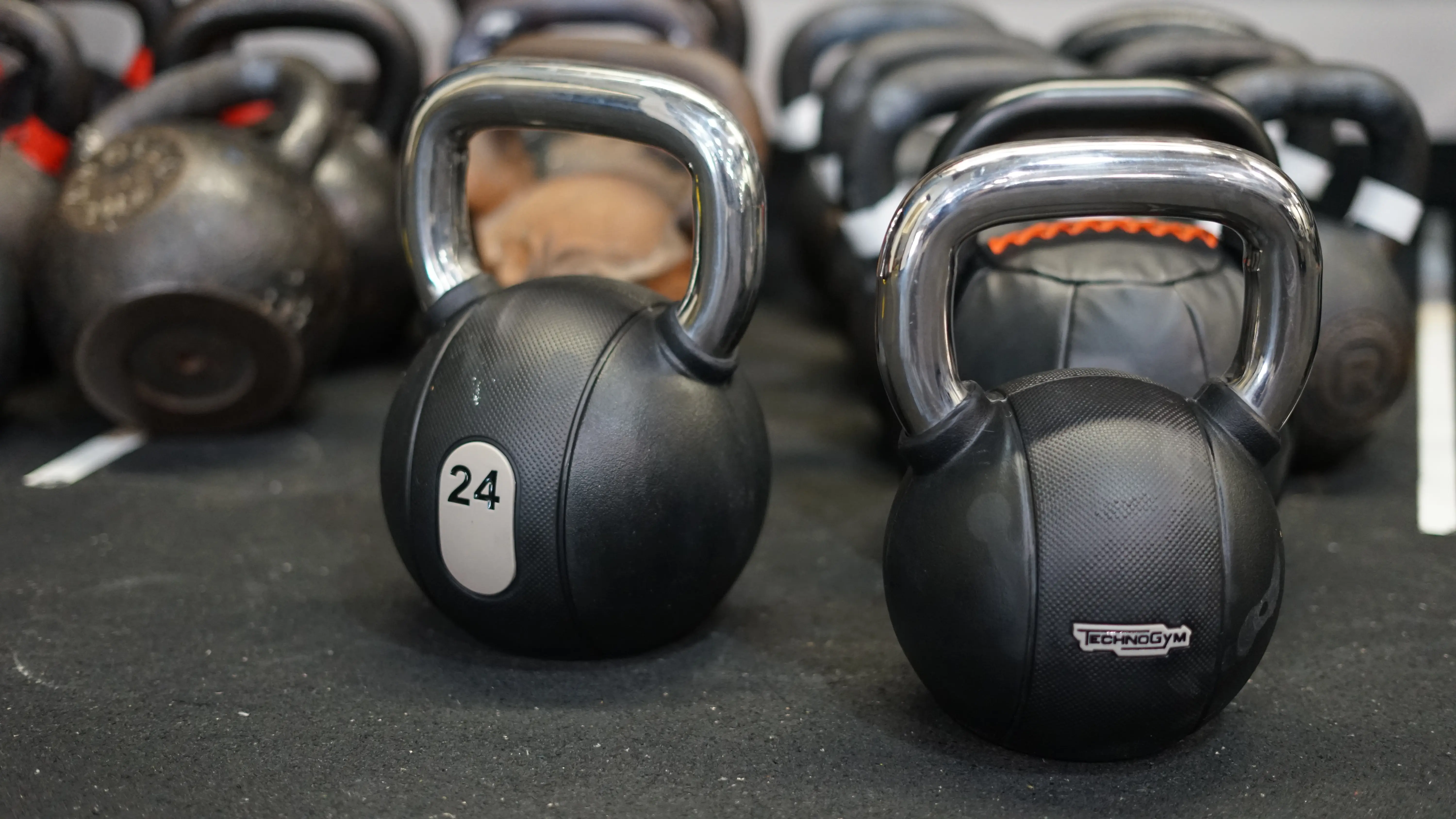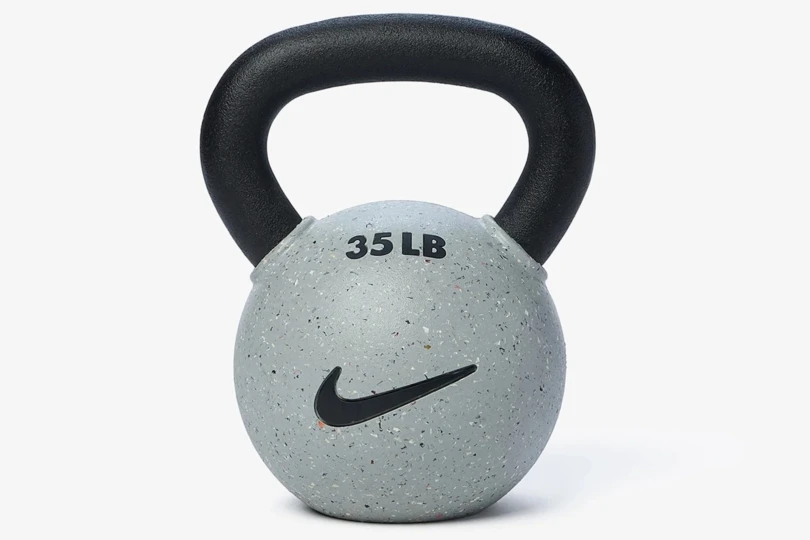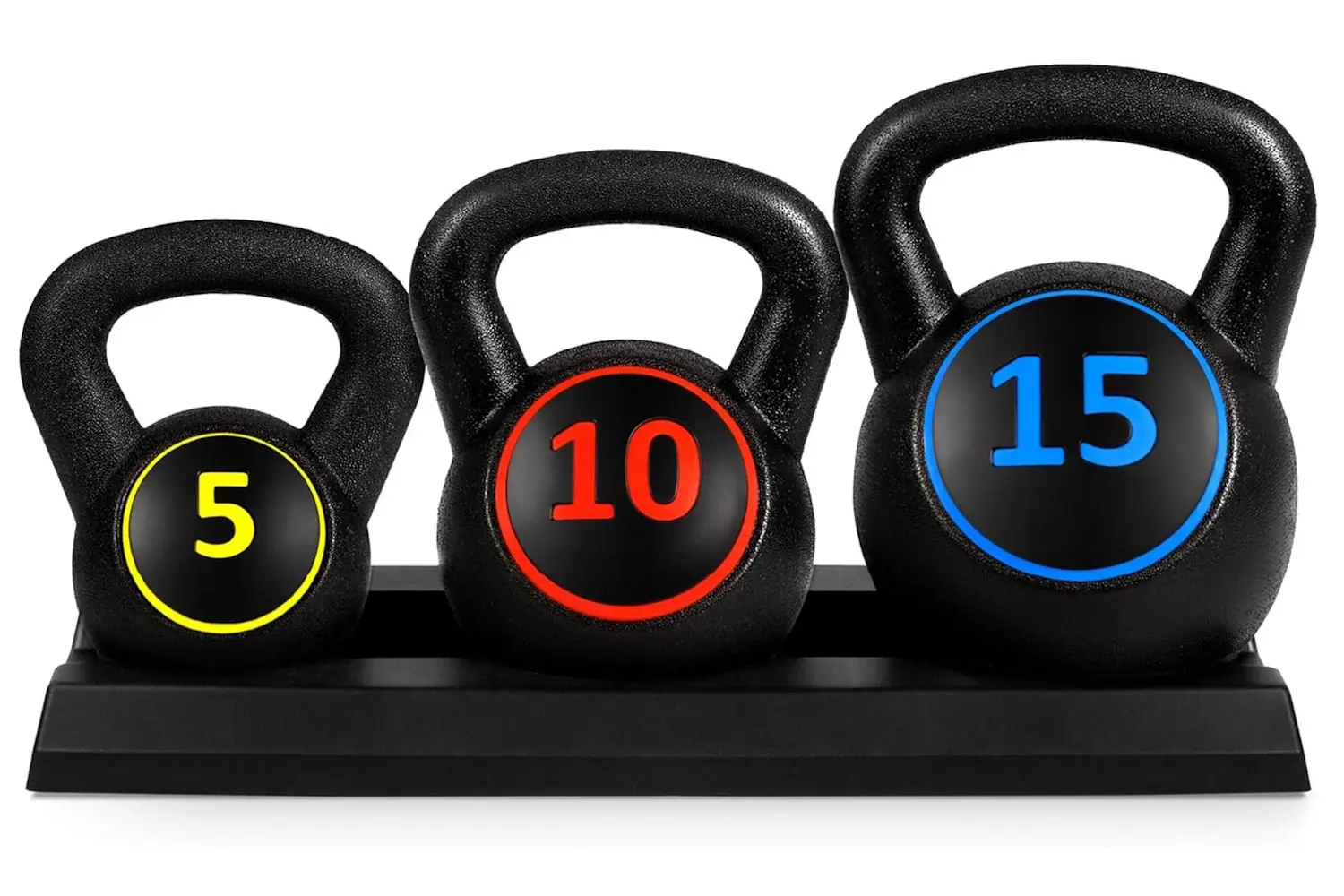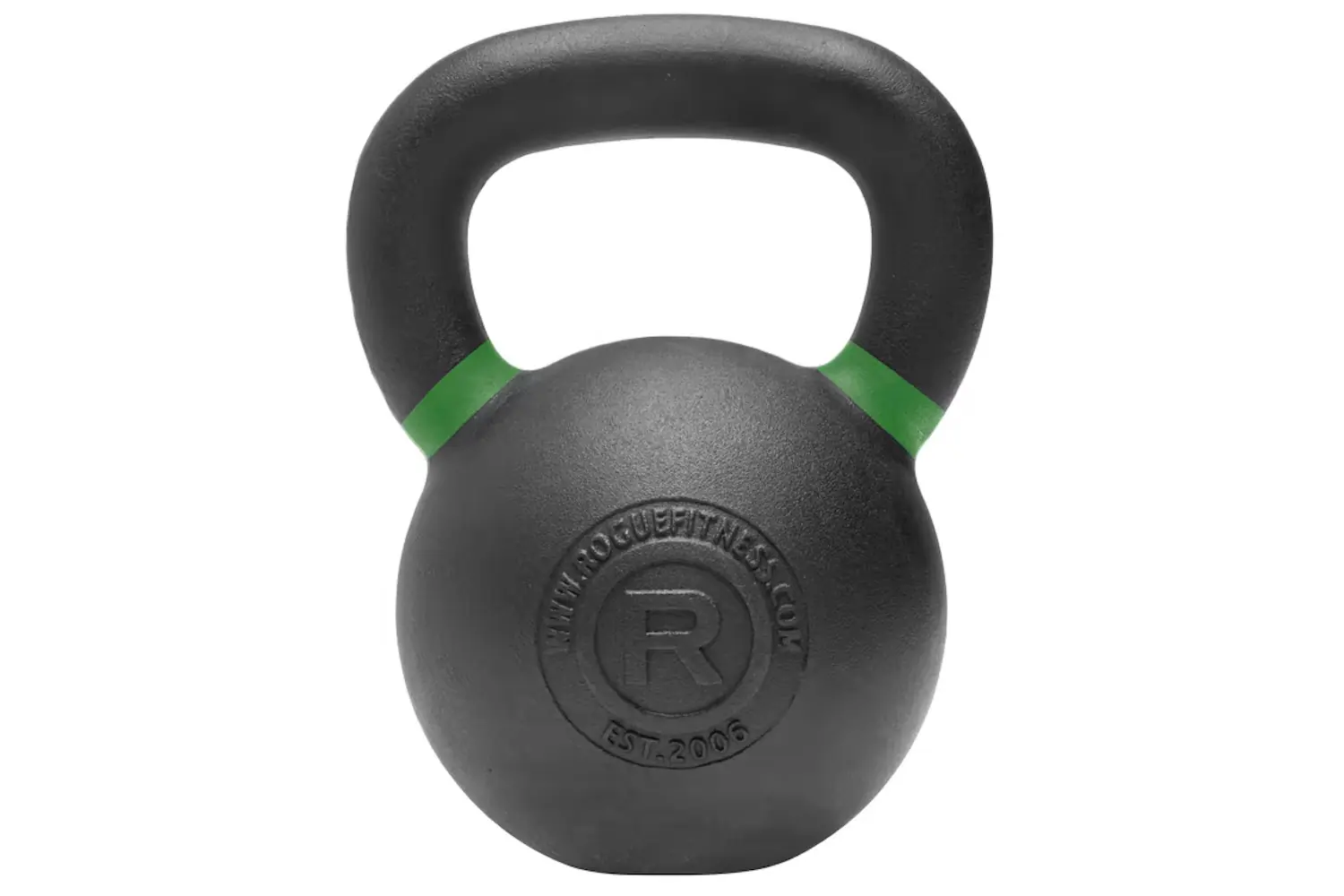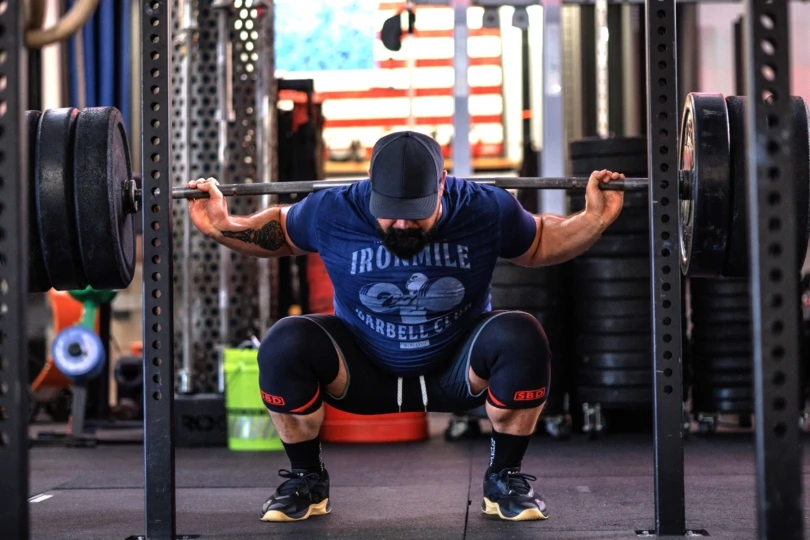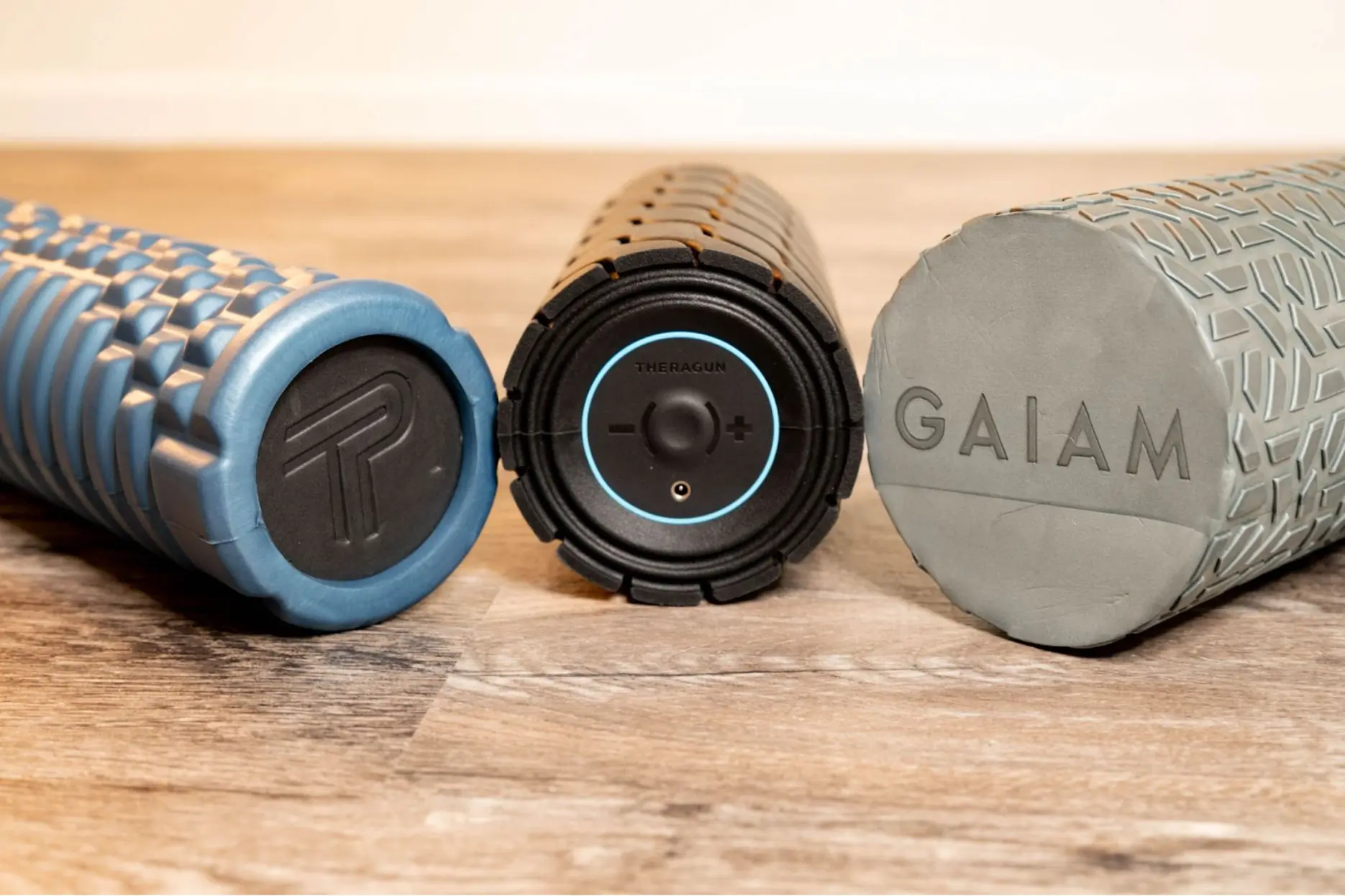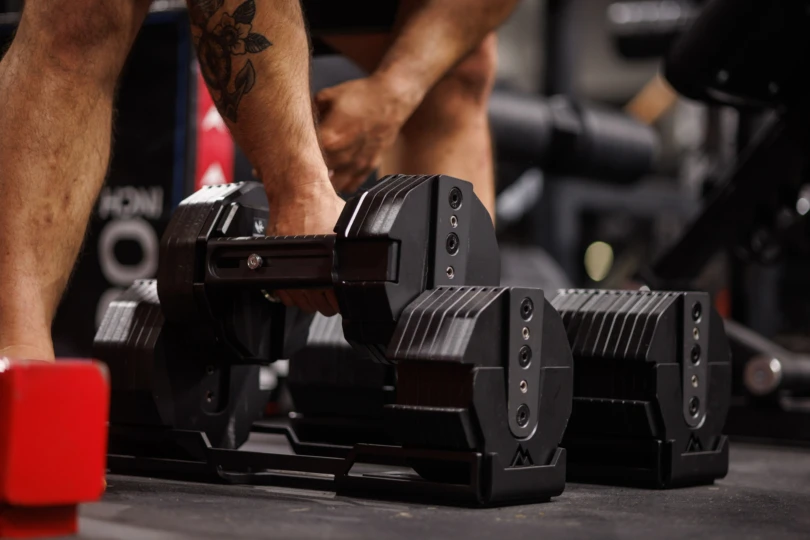While not as well-known as dumbbells and barbells, kettlebell weights are among the most versatile and (dare we say) fun pieces of workout equipment you’ll find. With their simple design (it’s basically a ball of metal with a handle), the best kettlebells offer an incredible array of uses in the fitness world.
Kettlebell weights range from 2.5 pounds to over 200 pounds, and many kettlebell movements can work every muscle in the body. Thought to have been developed in Russia in the late 1800s, strength devices similar to kettlebells have been found as far back as the halteres used in ancient Greece.
In recent years, kettlebells have recently come back into the spotlight. Their versatility has made them standard pieces of equipment in HIIT training, CrossFit workouts, and home gyms worldwide. We looked at some of the best kettlebells you can buy for your home gym, from lightweight offerings for beginners to standard competition bells for advanced athletes.
This guide will help you choose the perfect kettlebell, considering ability, ease of use, and budget. To wrap up our roundup, you’ll find our helpful Price & Value section, Buyer’s Guide, and frequently asked questions at the end of the guide.
Editor’s Note: For our October 30, 2025, update, we added our new favorite coated kettlebell, the Nike Rubber Coated Kettlebell. We also added ratings to each product to help you choose the right kettlebell for your needs
The Best Kettlebells for 2026
Top Picks
Eleiko Competition Kettlebell
-
Grip
9.5
-
Weight Range
9.0
-
Durability
9.0
-
Value
8.0
- Material: Powder-coated cast iron
- Handle: Bare cast iron
- Weight range: 8-32 kg in 4 kg increments
Pros
- Exceptional build
- Same size across the weight spectrum
- Flat sides
- Wide handle
Cons
- Pricey
- Sells out quickly
Amazon Basics Cast Iron Kettlebell
-
Grip
8.0
-
Weight Range
8.0
-
Durability
6.0
-
Value
8.0
- Material: Cast iron
- Handle: Cast iron
- Weight range: 10-60 lbs. in 5- to 10-lb. increments
Pros
- Low price
- Comfortable grip
- Flat sides
Cons
- Inconsistent quality
- Narrow weight range
Nike Rubber Coated Kettlebell
-
Grip
9.0
-
Weight Range
7.0
-
Durability
8.0
-
Value
7.0
- Material: Iron ore with rubber coating
- Handle: Powder-coated iron ore
- Weight range: 9, 13, 18, 26, 35, 44, 53 lbs.
Pros
- Wide handle window
- Grippy handle
- Flat bottom
- Rubber coating protects floor
- Recessed logo and text
Cons
- Weight tops out at 53 lbs.
Nike is a pillar of the sports world, so it was only a matter of time before the company ventured into the fitness equipment game. If the Nike Kettlebell ($52-$158) is any indication, Nike’s place in the gym is going to expand beyond footwear and apparel.
The 35 lb Nike Rubber Coated Kettlebell that I tested has a handle that’s about 5.5 inches from one top corner to the other, which is impressive for a smaller kettlebell. During swings, my hands barely touched each other, and I’m sure that with the larger kettlebells, they wouldn’t touch at all. Plus, the powder coating on the handle made it feel very grippy.
Made with a solid cast iron bell coated in Nike’s Grind recycled rubber and available in weights from 9 pounds to 53 pounds, the Nike Rubber Coated Kettlebell adds quite a bit of grip to movements like kettlebell squats. The rubber coating is also safer on floors, which home gym owners will appreciate.
If you’re looking for a kettlebell heavier than 53 pounds, you’ll have to look elsewhere. But if you’re not training for your next strongman competition, Nike’s max weight of 53 pounds should be enough for most CrossFit workouts.
Bowflex SelectTech 840
-
Grip
7.5
-
Weight Range
6.0
-
Durability
6.0
-
Value
8.0
- Material: Plastic, cast iron
- Handle: Iron
- Weight range: 8-40 lbs in varying increments
Pros
- Saves space
- Cheaper alternative to buying multiple kettlebells
- Easy to switch weights
Cons
- Bulky
- Weights can rattle in the bell
- Uncomfortable in overhead or one-handed movements
Best Choice 3-Piece Kettlebell Set
-
Grip
6.0
-
Weight Range
3.0
-
Durability
8.0
-
Value
8.0
- Material: Coated concrete
- Handle: Coated concrete
- Weight range: 5, 10, and 15 lbs
Pros
- Great for beginners
- Price
- Comes with storage rack
Cons
- Limited weight set
- Too light for experienced athletes
Rogue Kettlebells
-
Grip
8.0
-
Weight Range
9.0
-
Durability
8.0
-
Value
7.0
- Material: Powder-coated iron ore
- Handle: Powder-coated iron ore
- Weight range: 9-203 lbs. in varying increments
Pros
- Solid build
- Void-free surface
- Matte finish
- Weights up to 203 lbs.
Cons
- Pricey
- The coating occasionally degrades and flakes after a few years of use
-
Grip
5.0
-
Weight Range
8.0
-
Durability
8.0
-
Value
5.0
- Material: Rubber-coated cast iron
- Handle: Bare pitted stainless steel
- Weight range: 4-24 kg in 4-kg increments
Pros
- Tough rubber coating
- Smooth, comfortable grip
- Durable rubber coating
- Tough rubber coating
- Smooth, comfortable grip
- Durable rubber coating
Cons
- Handle can become slippery when wet.
- Inconsistent handle diameters
- Top weight is 24kg
-
Grip
6.0
-
Weight Range
6.5
-
Durability
7.0
-
Value
7.0
- Material: Weighted core with padded faux leather
- Handle: Painted steel
- Weight range: 10-40 lbs. in 5-lb. increments
Pros
- Soft body
- Safe for floors
Cons
- Slippery handle
- Weights may vary by several pounds
- Not as durable as metal kettlebells
-
Grip
7.0
-
Weight Range
9.0
-
Durability
6.0
-
Value
7.0
- Material: High Impact ABS Plastic
- Handle: High Impact ABS Plastic
- Weight range: Varies depending on dumbbell
Pros
- Great for travel
- Good option if you already have dumbbells
Cons
- Requires slight changes in form
- You need to already have dumbbells
Kettlebell Comparison Chart
| Kettlebell | Price | Material | Handle | Weight Range |
|---|---|---|---|---|
| Eleiko Competition Kettlebell | $80-$215 | Powder-coated cast iron | Bare cast iron | 8-32 kg in 4 kg increments |
| Amazon Basics Cast Iron Kettlebell | $22-$71 | Cast iron | Cast iron | 10-60 lbs. in 5- to 10-lb. increments |
| Nike Rubber Coated Kettlebell | $52-$158 | Powder-coated iron ore, recycled rubber | Powder-coated iron ore | 9-53 lbs. in varying increments |
| Bowflex SelectTech 840 | $149 | Plastic, cast iron | Cast iron | 8-40 lbs in varying increments |
| Best Choice 3-Piece Kettlebell Set | $50 | Coated concrete | Coated concrete | 5, 10, and 15 lbs |
| Rogue Kettlebells | $35-$320 | Powder-coated iron ore | Powder-coated iron ore | 9-203 lbs. in varying increments |
| Technogym Kettlebell | $100-$305 | Rubber-coated cast iron | Bare cast iron | 4-24 kg in 4-kg increments |
| Bionic Body Soft Kettlebell | $40-$140 | Weighted core with padded faux leather | Painted steel | 10-40 lbs. in 5-lb. increments |
| Kettle Gryp | $35 | High-Impact ABS Plastic | High Impact ABS Plastic | Varied |
How We Tested Kettlebells
Our Expert Tester
When he’s not writing, Affiliate Managing Editor Billy Brown is a competitive CrossFit athlete and powerlifter, former gym owner, and personal trainer. His training crosses many disciplines, including frequent and proper use of a kettlebell.
He used his decades of fitness experience and extensive testing to assess these and other kettlebells in order to develop this list.

Our Testing Process
All of the kettlebells considered for this buyer’s guide were put through weeks of testing in both home gym and commercial gym settings. Each one was taken through various kettlebell workouts as well as CrossFit workouts by multiple athletes.
They were evaluated for grip, balance, and feel over the course of movements like kettlebell swings, Turkish Get-Ups, snatches, goblet squats, and other movements. Durability was assessed based on daily wear-and-tear as well as specific tests like dropping the weights from overhead, (carefully) tossing the kettlebells across the gym, and repeatedly dropping the kettlebells into a pile of weights.
Our Kettlebell Rating System
Each kettlebell in this guide was tested and scored in four main categories: Grip, Weight Range, Durability, and Value.
Value considers how well a kettlebell performs for its price, factoring in comfort, durability, weight range, and price. A budget-friendly option can score high here if it delivers strong performance for the cost.
Grip evaluates how comfortable, roomy, and grippy the handle is. For kettlebells, this is hugely important because you’re generally swinging the weights around. How well a handle maintains its grip in sweaty conditions goes a long way in how highly it ranks. Same with a wider handle window: If a handle has enough room to comfortably fit both hands, it received higher marks.
Weight Range considers what sizes are available for the kettlebell. Usually, eight pounds to 53 pounds is the benchmark, with higher marks going towards kettlebells that offer weights of 70 pounds or more.
Durability looks at build quality and reliability over time, including materials, ruggedness, resistance to drops, and whether the kettlebell will hold up over years of abuse.
The overall score is not a simple average of these categories. Instead, it reflects my editorial judgment based on the complete user experience. That means a less durable kettlebell with an extremely high weight range can still score high, while a kettlebell with a lower weight range might rank higher for its beginner-friendliness.
Buyer’s Guide: How to Choose the Best Kettlebells
Weight
Kettlebells come in a wide range of weights. You can find kettlebells from 2.5 to over 200 pounds; choosing the right one for you can be daunting. If your budget can swing it, shoot for a lighter kettlebell for higher rep workouts and a heavy one for strength-based workouts.




“Light” and “heavy” are relative terms, however. The standard prescribed weight in CrossFit is 53 pounds for men and 35 pounds for women. If you’re new to working out, consider lighter bells. Something in the 15- to 25-pound range should work for most beginners.
Handle
As your main point of contact with the kettlebell, the handle is an important consideration. Two things to factor in are grip and hand space. The first thing to look at is the size of the handle. The main movement with kettlebells is the kettlebell swing. This entails gripping the handle with both hands and swinging it from between your legs to eye level or overhead.
That said, you’re going to need enough room to grab the handle with both hands. Most kettlebell handles are roomy enough for this (all the ones on this list do), but some don’t. Luckily, this is a serious offense in the kettlebell community. So it should be easy to find out in online reviews.
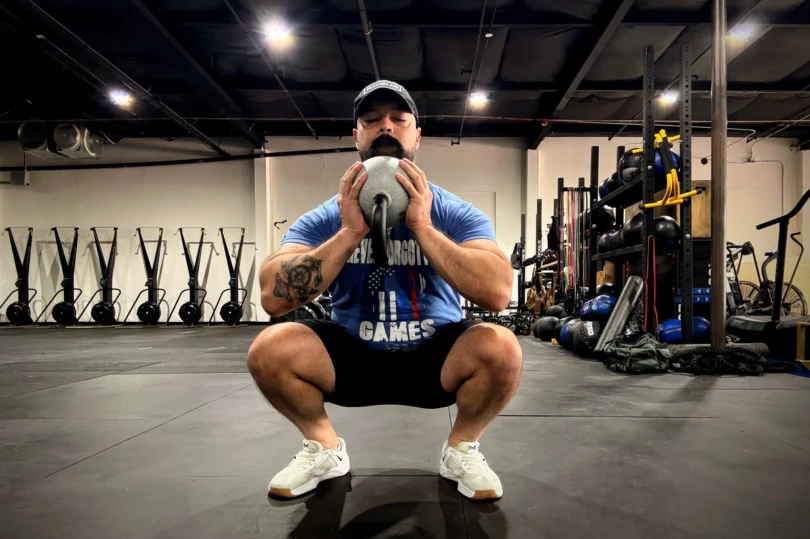



Also, consider the handle’s grip. A smooth grip may feel good initially, but it can get slippery. This is an especially big deal with heavy kettlebells. Consider a pitted or textured handle. These not only provide more grip, but they also retain chalk better for extra friction.
Vinyl-Coated vs. Non-Coated
The question of vinyl-coated versus non-coated is really a matter of whether or not you plan to use your kettlebell in your home. Vinyl is a potential weak point since it can tear off after vigorous use or drops. If you plan to use your kettlebell in the garage, you’re probably going to be rough with it, so go for a non-coated kettlebell. If you’re using your kettlebell in the house, vinyl is a good choice.




Vinyl coating works well as a protectant for the floor and other surroundings. It also damps the noise when you set it down. Also, you will likely be treating your kettlebell more gingerly (no tossing it on the ground when you’re done with it). So it’s less likely that you’ll find a way to tear the coating.
Price & Value
You can expect to pay just over a dollar a pound for a good kettlebell from a well-known brand. You can go with off-brand cheap kettlebells from a less established brand, but you may be sacrificing quality.
Budget
The biggest factor when it comes to cost is how much a kettlebell weighs. The heavier it is, the pricier the kettlebell. However, you can cut some of the cost by going with off-brand kettlebells which usually can be found for under $100. Like our budget pick, the Amazon Basics Cast Iron Kettlebell, which tops out at $71 for the 60-pound weight. Or, if you already have some dumbbells, you can convert them into kettlebells with the Kettle Gryp, which costs $35 and adds a kettlebell handle to most standard dumbbells.
Mid-Tier
Mid-tier kettlebells usually cost anywhere between $100 and $150. These kettlebells are usually made with uniform weight, non-slip handles, and durable materials like iron ore or cast iron. You can buy or top pick Eleiko Competition Kettlebells, with their excellent grip and uniform bell diameter, weighing up to 44 pounds for $135 or less. Or, if you’re tight on space, the Bowflex SelectTech 840 ($149) changes weight from 8 to 40 pounds, all in one kettlebell.
Premium
If you’re looking for a heavier kettlebell, you’ll be paying premium prices. Rogue Kettlebells go up to 205 pounds, with the 205-pounder costing a hefty $320 (not including shipping). Premium materials can also raise the price, as the heaviest Technogym Kettlebell is only 53 pounds, but its grippy stainless steel handle and rubber-coated cast iron bell bump the cost up to $305.
Kettlebells can be pricey, especially if you’re looking for a durable or competition bell. The heavier you go, the more expensive they get. Especially when you consider shipping costs. Rogue Fitness’s 200-pound kettlebell costs $250, plus another $250 for shipping.
You can expect to pay just over a dollar a pound for a good kettlebell from a well-known brand. You can go with off-brand cheap kettlebells from a less established brand, but the quality of construction may be compromised.
Frequently Asked Questions
It depends on your level of fitness. The standard weight for men’s workouts in CrossFit is 53 pounds. For women, the standard weight is 35 pounds. If you’re new to kettlebell workouts or fitness in general, go lighter. Somewhere between 15 and 25 pounds should work for most people.
For building strength, shoot for a heavier weight. Strength athletes will regularly use 70- to 100-pound dumbbells. If you’re planning to upgrade to heavier weights, start slow. Get comfortable with the weight with Russian (eye-level) kettlebell swings and ease your way up to going overhead.
Both are versatile pieces of equipment. They can do many similar movements like goblet squats, snatches, and overhead presses. However, a dumbbell’s shape is ideal for movements like curls and tricep extensions, whereas a kettlebell’s shape is less ideal for these. A kettlebell, on the other hand, is great for dynamic movements like swings and two-handed movements like upright rows.
Competition kettlebells are most easily recognized by their size. Every competition bell is the same size, regardless of the weight. Also, competition kettlebells are usually made from steel. This makes them more durable than bells made of iron.
Thanks to the wide range of movements kettlebells can handle, you can use kettlebells as often as you’d like. You can do an upper body workout one day and lower the next. Or you can alternate lighter with heavy workouts every other day. There are people who work out exclusively with kettlebells 5-plus days a week, depending on their programming.
